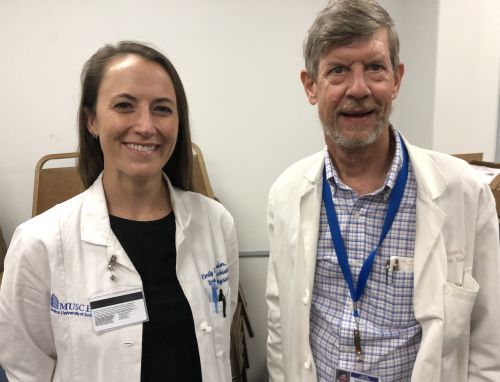 Stories that color-in the stark lines of evidence-based medicine
Stories that color-in the stark lines of evidence-based medicine
Dr. Higgins’ Take:
Some patients experience disturbing withdrawal symptoms when stopping psychotropic medications. Are these the “hot flashes” of psychiatric treatment?
In her book Strangers to Ourselves: Understanding Minds and the Stories that Make Us, Rachel Aviv in her elegantly written, deeply researched style, presents six stories, one of which is about a woman who experienced debilitating side effects getting off her medication.
In her adolescence Laura was diagnosed with bipolar disorder and started on medication. Laura relished her Bipolar diagnosis. She purchased a DSM and liked to read-up on symptoms before presenting them to her psychiatrist. She enjoyed when her medications were adjusted. She was catnip for a biological psychiatrist.
Except, in the long run, she wasn’t improving – actually she was getting worse.
After muscling through Harvard and a serious suicide attempt, she and her psychiatrist continued to adjust her medications. At 27 she was taking eight medications, had lost contact with friends, had never experienced an orgasm or even libido, had gained 40 lbs, and wasn’t working. She was emotionally numb; her family was distraught.
Along the way her diagnosis changed to borderline personality disorder which, frankly, was not as appealing to Laura. She started questioning the biological model of her problems and decided to get off the medications. Her reluctant psychiatrist suggested stopping the benzodiazepine first and a few weeks later the aripiprazole. That’s when the really weird symptoms started. It got worse when she stopped the venlafaxine . . . dizzy, electrical zaps, an episodic whoosh feeling in her head. It was like nothing she’d ever felt before.
Are these the “hot flashes” of psychiatry – the strange symptoms that appear, seeming out of nowhere when medications (or sex hormones – and this is true for castrated men as well) are rapidly reduced? Laura’s story fills in a knowledge gap seldom discussed in my training or CME courses.
It was six months before Laura was capable of working part time. Later, she found solace writing a blog about her experience which resonates with many former patients. She is now a leader in an online community assisting others who struggle to discontinue their psychiatric medication. Laura assists with topics such as compounding, micro tapering, and simply accompanying them on the long road. We might call this complementary psychiatry.
Psychotrophic withdrawal side effects are not new, but more common and enduring than we might imagine. Almost all the studies come out of Britain and former UK countries where single payer health care is less inclined to leave people on antidepressants for decades. Reports have documented protracted withdrawal which can last several months to several years. Some patients need remarkably slow and gentle tapers.
This brings up an even more confusing issue – what’s withdrawal . . . and what’s the return of the old symptoms? The author addresses this when she discusses her own decade with escitalopram, cycling between termination and resumption.
Editor’s note: For more information, see: How to Come Off a Psych Med: Antidepressants, Stimulants and Benzos, by Swapnil Gupta, MD. The Carlat Psychiatric Report, March 2021.
Dr. Whisler’s Take:
Atul Gawande in his book The Checklist Manifesto writes “Medicine has become the art of managing extreme complexity – and a test of whether such complexity can, in fact, be humanly mastered” (Gawande A. The Checklist Manifesto. Profile Books; 2011). In the face of this complexity, checklists and algorithms have been created in every specialty to minimize mistakes and improve safety. In psychiatry we have shifted from analytic roots to reliance on the standardized labels of the DSM to develop our formulations. Pattern recognition and referral to an ever-growing evidence base is vital to diagnosing and treating quickly and accurately without being mired in unnecessary detail. We also try to recognize the impact of broad sociocultural factors throughout the evaluation and treatment process. Yet, there are times we fail to consider how our model of mental suffering affects the patient.
Strangers to Ourselves describes six patients whose psychiatric diagnoses are defined within a Western model and seen through a biologic lens. Each patient's history can be identified as an archetype of the illness represented. But Aviv moves beyond diagnostic criteria, transforming these histories by interweaving sociocultural influences. The stories are about how mental illness is interpreted and then addressed, at times clumsily and to the detriment of the patients.
Multiple stories contained in the book showcase the paternalistic medical approach, discounting patient perspective, and minimizing patient insight, neglecting them as a key witness to their experience. Naomi, a Black woman in the Midwest, is diagnosed with a psychotic disorder. She describes feeling a separation from her predominantly White doctors. “They missed the mark. The doctors’ lack of knowledge about who I am and where I come from pushed me farther and farther away.” She felt afraid raising her children in America. Her insistence on the reality of racist social forces was labelled “bizarre,” further evidence of her psychosis, an alienation which hindered her ability to receive treatment.
Naomi’s story mirrors the others in considering how insight, the often-critical component of assessment, is determined based on the provider’s perspective and deemed appropriate by the dominant culture. In these cases, the author presents the complex nature of a diagnosis’ meaning, and how the stories told about them “can shape their course.” A diagnosis can offer hope and absolve an individual of perceived blame, or it can become an inescapable facet of one’s identity. That trajectory may be difficult to assess at the outset. The stories in Strangers to Ourselves are examples of the complexity of psychiatric diagnosis and treatment, and what can happen when physicians rely too heavily on one set of algorithms.
 Dr. Whisler is a Child & Adolescent Psychiatry Fellow, Stanford University School of Medicine. Dr. Higgins is Affiliate Associate Professor, Psychiatry and Behavioral Sciences, Medical University of South Carolina.The authors have no financial relationships with companies related to this material.
Dr. Whisler is a Child & Adolescent Psychiatry Fellow, Stanford University School of Medicine. Dr. Higgins is Affiliate Associate Professor, Psychiatry and Behavioral Sciences, Medical University of South Carolina.The authors have no financial relationships with companies related to this material.

_-The-Breakthrough-Antipsychotic-That-Could-Change-Everything.webp?t=1729528747)



